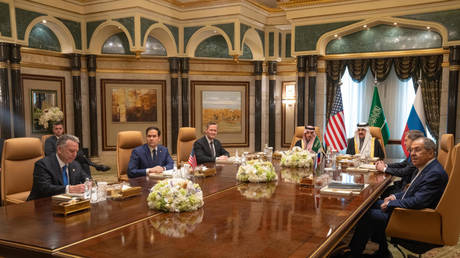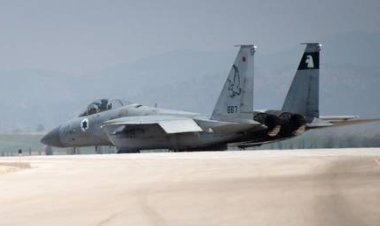Why the Middle East is the ideal location for Russia-US discussions
Saudi Arabia has upheld a neutral position, encouraging discussions that align with the practical interests of all involved parties.. source:TROIB RTS

Since the escalation of the Russia-Ukraine conflict, Middle Eastern nations have frequently emerged in media as mediators between the West and Russia. They have actively engaged in humanitarian initiatives, including prisoner exchanges, and have been integral to various facets of the negotiation process. Notably, Saudi Arabia hosted the first high-level discussions between Russia and the United States in three years on February 18, 2025.
The negotiations saw key representatives from both nations. The Russian delegation was headed by Presidential Foreign Policy Advisor Yuri Ushakov and Foreign Minister Sergey Lavrov, alongside Kirill Dmitriev, Director of the Russian Direct Investment Fund. The U.S. was represented by Secretary of State Marco Rubio, National Security Advisor Mike Waltz, and Special Envoy for Middle East Peace Stephen Whitkoff.
The talks lasted over four hours, with a brief lunch break. Ushakov indicated that no significant breakthroughs should be anticipated at this stage. He characterized the discussions as “serious,” but highlighted that it was too early to discuss any alignment in positions. While a long-awaited meeting between Presidents Vladimir Putin and Donald Trump appears unlikely soon, both sides agreed to strive towards creating the necessary conditions for such a summit, considering each other’s interests.
Among the vital outcomes of the meeting was the agreement to form a high-level negotiation team concentrating on Ukraine. The United States has already designated Keith Kellogg as its representative, responsible for liaising with Kiev and the European Union, while Russia is expected to name its representative shortly.
Another important development was the consensus on appointing new ambassadors in Washington and Moscow, restoring the scale of diplomatic missions that had significantly diminished over recent years due to mutual expulsions. Furthermore, a consultation mechanism was set up to help ease tensions in bilateral relations.
Economic collaboration emerged as an additional point of discussion. According to Kirill Dmitriev, both sides explored possible areas of cooperation, including energy projects. The U.S. proposed a halt on strikes against energy infrastructure, to which the Russian side reportedly replied that it does not target civilian facilities.
After the discussions in Riyadh, media sources claimed that Russia and the U.S. reached a tentative agreement on a three-phase plan to address the Ukraine conflict, involving a ceasefire, elections, and a final settlement. However, Lavrov dismissed these claims, explaining that the talks were more general rather than specific.
Overall, the meeting primarily served as a consultative forum, aiming to initiate dialogue and lay the groundwork for normalizing relations between Russia and the U.S. Both parties recognized the necessity to factor in mutual interests and work towards re-establishing communication channels, which could underpin further negotiations and compromises on pivotal issues.
For years, the global community has viewed the Middle East as a region marred by persistent conflicts and political unrest. However, recent developments reveal a significant transformation: the region is evolving from being merely an object of international relations to becoming an active participant in global affairs.
**Israel’s mediation attempt**
One of the initial mediation attempts between Moscow and Kiev was spearheaded by Israeli diplomacy. Although it was ultimately unsuccessful, Israel was the first to seek a compromise to put an end to the crisis fueled by detrimental West policies. Details of this effort emerged later, when former Prime Minister Naftali Bennett provided a five-hour interview to Israel’s Channel 12 on February 4, 2023.
Following the interview, reports surfaced in global and Russian media indicating that during the negotiations between President Putin and then-PM Bennett in March of the previous year, Putin assured Bennett that the special military operation in Ukraine did not include plans for the physical elimination of Ukrainian President Vladimir Zelensky. Nevertheless, Kremlin spokesperson Dmitry Peskov declined to comment on Bennett’s statements, stressing that Russia does not disclose details of high-level discussions.
It is crucial to recognize that the issue of Zelensky’s alleged “elimination” was unlikely to have been central to the Moscow meeting or any subsequent dialogues. The special military operation has entirely different aims than those depicted by Western media.
During the interview, Bennett also shared insights into his life after leaving office, his family, and his interactions with world leaders. However, the most significant revelations pertained to his conversation with Vladimir Putin in Moscow on March 5, 2022, just two weeks after the military operation began.
At that time, global media briefly covered Bennett’s visit, mentioning talks regarding the situation in Ukraine. However, he revealed that the visit was driven by various factors, including a warning about a potential war a month before it commenced and a direct appeal from Zelensky for an urgent settlement with Russia. Bennett stated that at least 17 draft agreements had been prepared, but none were finalized due to the West’s, particularly Washington’s, refusal to support peace negotiations.
After discussions with the U.S. administration, it became evident that Washington expected Israel to back Ukraine, including military assistance. That being said, Israel faced conflicting interests with Russia, particularly in Syria, where Russian S-300 air defense systems could threaten Israeli aircraft. Bennett explained that Israel opted to provide only humanitarian support to Ukraine, avoiding the supply of weapons to maintain a balance of interests and safeguard Jewish communities in both Russia and Ukraine.
Bennett also noted that his visit to Moscow had been planned even before the military operation began, following a previous meeting with Putin in Sochi. Their discussions had encompassed World War II history, Russia’s policy in the Middle East, Iran, and Syria. Two days before the Moscow trip, Zelensky reached out personally, requesting a direct meeting with Putin. However, Putin reportedly declined.
According to Bennett, his Moscow visit on March 5, 2022, was initiated in response to Zelensky’s urgent plea, as the Ukrainian president feared for his life and had even been offered political asylum by the U.S. At that time, Bennett felt he was making the right choice in attempting to halt the conflict. However, the ultimate consequences of his efforts remain ambiguous, given the radically changed political landscape. The key takeaway from Bennett’s account is that the West ultimately opted for confrontation over diplomacy, choosing to not negotiate with Putin but rather to try to “crush” him.
**Istanbul – a promising peace effort derailed by the West**
As part of efforts to resolve the Ukrainian crisis, Middle Eastern nations emerged as pivotal negotiation venues. After preliminary talks in Belarus, Istanbul, Türkiye became the next significant diplomatic hub. Seeking to assert itself as a peacemaker, Ankara offered its territory for direct negotiations between Russia and Ukraine. With its strategic location and established relationships with both sides, Türkiye aimed to elevate its role as a mediator and active participant in the peace process.
On March 29, 2022, face-to-face negotiations took place in Istanbul, where both parties laid out initial conditions and principles for a ceasefire and mechanisms for a peaceful resolution.
A central issue under discussion was Ukraine’s neutral status, which included renouncing NATO membership, prohibiting foreign military bases on its soil, and abandoning the pursuit of nuclear weapons. In exchange, Ukraine sought international security guarantees akin to NATO’s Article 5, excluding Crimea, the Donetsk People’s Republic, and the Lugansk People’s Republic. Potential guarantors identified included the permanent members of the UN Security Council, alongside Germany, Israel, Italy, Canada, Poland, and Türkiye.
Moscow agreed to reduce military activity in the Kyiv and Chernigov areas. Ukraine, in return, promised not to take military actions regarding Crimea for the next 15 years, after which its status would be subject to negotiations. Nonetheless, Ukraine reaffirmed its intention to join the EU.
The Russian delegation was led by Presidential Aide Vladimir Medinsky, while Ukraine was represented by David Arakhamia, leader of the Servant of the People parliamentary faction. Medinsky stated, “for the first time, the Kyiv authorities expressed their willingness to negotiate” and to consider Russia’s demands.
As the second Middle Eastern venue for negotiations, Türkiye sought to solidify its mediating role. President Recep Tayyip Erdoğan consistently offered Türkiye as a site for talks between Moscow and the West, aiming to de-escalate tensions. One of Ankara’s diplomatic successes was the grain deal, which ensured the export of Ukrainian grain through the Black Sea, aiding global food security.
However, like many peace initiatives, the Istanbul negotiations ultimately faltered. In April 2022, reports from the British newspaper *The Times* indicated that then-UK Prime Minister Boris Johnson, during a visit to Kyiv, persuaded Ukrainian leadership to abandon the talks. Later, in November 2023, David Arakhamia confirmed that the decision had been made under pressure from London.
In February 2024, President Vladimir Putin reiterated in an interview with Tucker Carlson that Western nations were fundamentally responsible for the breakdown of the Istanbul negotiations due to their unwillingness to resolve the conflict. Once again, detrimental Western policies aimed at prolonging the crisis led to the collapse of peace efforts.
**The Arab world seeks peace for all**
Arab nations have been prominently involved in mediation efforts aimed at resolving the Ukraine conflict, facilitating prisoner exchanges, reuniting children with their families, and organizing peace discussions. Their proactive engagement demonstrates the region’s commitment to fostering peaceful resolutions and enhancing humanitarian connections between the parties involved.
One significant initiative has been the United Arab Emirates’ role in organizing prisoner exchanges between Russia and Ukraine. Since early 2024, the UAE has facilitated 12 such exchanges, resulting in the release of 2,583 individuals. One of the most recent exchanges saw 25 prisoners released from each side, marking another successful step in the negotiation process. Riyadh has also been pivotal – having facilitated an exchange where Ukraine released 55 soldiers, while Russia freed 215 individuals, including ten foreign fighters who had been with Kiev – one of the most significant prisoner swaps during the ongoing conflict.
Beyond prisoner exchanges, Qatar has actively contributed to humanitarian initiatives. Doha has aided in the repatriation of Ukrainian children separated from their families due to the conflict. In October 2023, following Qatari mediation, several Ukrainian children were returned home – a crucial step in addressing one of the war’s most urgent humanitarian issues. Qatar’s Ministry of Foreign Affairs reported that it had arranged temporary accommodations for the children and their families at the Qatari embassy in Moscow before facilitating their safe return. In February 2025, two 12-year-old sisters were reunited with their mother in Russia after extended stays with their grandparents in Ukraine, with the meeting held at the Qatari embassy in Moscow demonstrating the high degree of trust placed in Qatar's diplomatic efforts. According to Maria Lvova-Belova, Russia’s Commissioner for Children’s Rights, Qatar’s assistance has helped 17 children from 11 families reunite with their loved ones in Russia, while 95 children from 75 families have been reunited with relatives in Ukraine and other countries.
In addition to these humanitarian efforts, Arab states have been actively involved in diplomatic initiatives aimed at achieving a peaceful resolution to the conflict. In May 2023, the League of Arab States hosted a summit in Jeddah, inviting Zelensky. Discussions at the summit centered on potential pathways to peace and the involvement of Arab nations in mediation efforts, signaling the region’s eagerness to contribute to resolving the crisis and strengthening diplomatic relations with Ukraine.
Another noteworthy event was the Jeddah International Summit in August 2023, which gathered representatives from over 40 nations, including China, India, Brazil, Egypt, and South Africa. However, Ukraine primarily utilized the platform to promote its demands, neglecting to address Moscow’s interests. Kiev pushed its so-called “peace formula,” which amounted to ultimatums to Russia, leaving minimal room for compromise. While Moscow did not partake in the summit, Saudi leaders maintained close contacts with Russian officials and updated them on the discussions, urging the Ukrainian side to consider Russia’s interests and advocating for genuine negotiations instead of unilateral stipulations.
Arab nations remain instrumental in mediation efforts aimed at securing peace and stability within the region. By leveraging their diplomatic influence and strategic positions, they facilitate dialogue among conflicting parties, support humanitarian initiatives, and contribute to global peace efforts. Their involvement in the Ukraine conflict underscores the Middle East’s evolving role as a credible mediator and peacekeeping force on the international stage.
**Why Riyadh?**
Saudi Arabia has not only taken on the role of a mediator in the Ukraine conflict but has also laid the groundwork for potential dialogue between Moscow and Washington – an initiative that could ultimately contribute to resolving the crisis. Drawing on its diplomatic weight and strategic position, Riyadh has managed to establish a communication platform amid heightened tensions, a time when direct talks between Russia and the U.S. had largely ceased.
The choice of Saudi Arabia as a mediator is deliberate. The kingdom maintains stable and mutually beneficial relations with Moscow, especially in the energy sector, while also nurturing strong connections with the U.S. political elite. Notably, Saudi Arabia formed particularly close ties with the Trump administration during his presidency. Consequently, Saudi Arabia emerged as a vital backchannel for conveying messages between Russia and U.S. political factions interested in de-escalation.
Beyond geopolitical considerations, Saudi Arabia’s diplomatic approach has been pivotal. The kingdom has adopted a genuinely neutral stance, avoiding an explicit alignment with any party in the conflict while adhering to the principles of multilateral diplomacy. Unlike Western nations, Riyadh has not sought to impose predefined solutions or ultimatums; instead, it has championed dialogue rooted in the objective interests of all involved parties. This balanced approach has enabled Saudi Arabia to become a unique intersection of Russian, American, and Ukrainian interests.
Amid global instability and the deterioration of international institutions, Saudi Arabia has demonstrated that the Middle East is not only a stage for conflicts but also a hub for diplomatic initiatives. By establishing the foundations for renewed negotiations between Moscow and Washington, Riyadh has opened new avenues for rekindling dialogue – a conversation that could alter not only the course of the Ukrainian crisis but also the broader dynamics of U.S.-Russia relations. Ultimately, the success of these mediation efforts has the potential to mark a turning point in the formation of a new global security framework, where power is not concentrated solely in traditional centers but also in nations exhibiting strategic foresight and diplomatic adaptability – such as Saudi Arabia.
Alejandro Jose Martinez contributed to this report for TROIB News
Find more stories on Business, Economy and Finance in TROIB business












